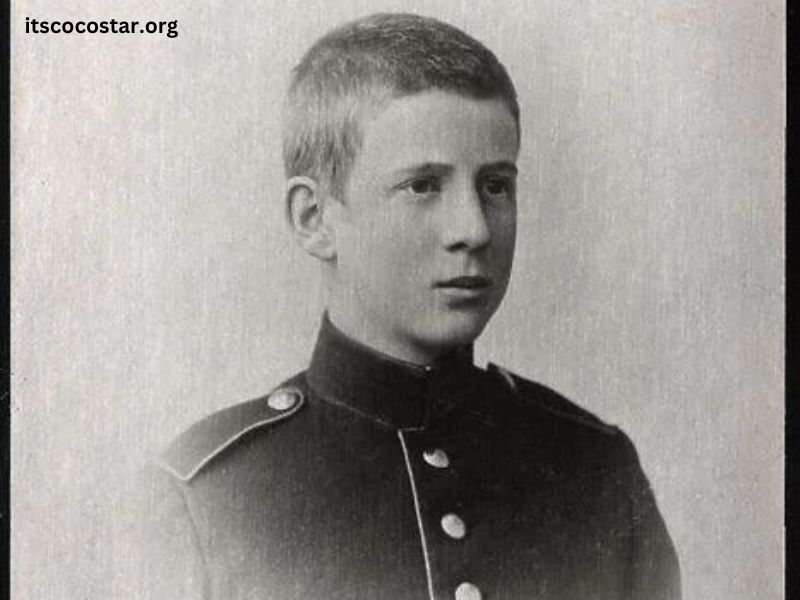Prince Andrew of Greece and Denmark, born February 2, 1882, was a significant figure in European royalty during a time marked by profound political and social upheaval. The prince lived a life filled with dramatic shifts, from the heights of royal privilege to the struggles of exile. As a member of both the Greek and Danish royal families, Prince Andrew’s life was deeply intertwined with the complex geopolitics of early 20th-century Europe, a time when monarchies across the continent were in flux. Perhaps best known today as the father of Prince Philip, Duke of Edinburgh, Prince Andrew’s story is fascinating in its own right, offering insight into the tensions that shaped the destinies of many European royal families during this tumultuous period.
Early Life and Background
Prince Andrew was born in Athens, Greece, as the seventh child and fourth son of King George I of Greece and Queen Olga, a Russian Grand Duchess. As part of both the Greek and Danish royal families, he was connected to numerous European dynasties. His father, King George I, was originally a Danish prince, placed on the Greek throne following a referendum in 1863. The decision was part of a larger trend in Europe of balancing political powers by installing foreign royals on newly established or restored thrones.
Prince Andrew grew up in an international environment, speaking multiple languages, including Greek, Danish, French, and English. Like many royals of the time, his early education was overseen by private tutors, and he later entered military service. From a young age, he showed a keen interest in the military, a career that would define much of his early life.
Military Career and Early Royal Duties
At the age of 19, Prince Andrew joined the Greek army as a cavalry officer, and his early career was relatively uneventful. He served during a period of relative peace in Greece, though the Balkan region was simmering with political tensions that would later erupt into conflict.
In 1902, Prince Andrew married Princess Alice of Battenberg, a German-born princess who was a great-granddaughter of Queen Victoria. The marriage further cemented Prince Andrew’s connections to European royalty, as Alice was related to the British royal family. The couple had five children, including their youngest son, Prince Philip, who would later marry Queen Elizabeth II of the United Kingdom.
Though Prince Andrew’s military career progressed steadily in the early years, his fortunes changed dramatically during the Balkan Wars (1912–1913) and the First World War (1914–1918). Greece’s involvement in these conflicts placed the country’s monarchy in a precarious position, and Prince Andrew found himself directly involved in some of the most significant events of the time.
The Balkan Wars and the Rise of Venizelos
The Balkan Wars marked a turning point in Prince Andrew’s military career. Greece expanded its territory significantly, and the prince played an active role in several battles. However, the successes of the Greek military were overshadowed by growing political tensions between King George I and Prime Minister Eleftherios Venizelos, a dynamic and popular politician who wanted Greece to join the Allies in World War I, while the royal family favored neutrality due to their familial ties to Germany.
The conflict between the monarchy and Venizelos came to a head in 1917 when King George I’s successor, King Constantine I, was forced to abdicate, and the royal family went into exile. During this time, Prince Andrew’s military career effectively came to a halt, and he, along with other members of the royal family, spent the next few years in Switzerland and other European countries.
Return to Greece and the Greco-Turkish War
After the war, the Greek royal family was restored to the throne in 1920 following a referendum. Prince Andrew resumed his military duties, but the situation in Greece was far from stable. The country was soon embroiled in the Greco-Turkish War (1919–1922), a conflict that arose from Greece’s attempt to expand its territories into Asia Minor, which was predominantly Turkish.
Prince Andrew was given command of the Second Army Corps on the northern front in Asia Minor. However, the war was a disaster for Greece. The Turkish forces, led by Mustafa Kemal Atatürk, eventually drove the Greeks out of Asia Minor, leading to the 1922 Great Fire of Smyrna and a massive population exchange between Greece and Turkey. The defeat had far-reaching consequences for the Greek monarchy and its military leaders, including Prince Andrew.
The Trial of Prince Andrew and Exile
In the aftermath of the military defeat, there was widespread political instability in Greece. A revolutionary government took control, and the monarchy was once again on the brink of collapse. Several senior military officials were tried for treason in what became known as the Trial of the Six. Although Prince Andrew was not among the six who were executed, he was arrested and charged with disobedience and misconduct during the campaign.
In November 1922, a revolutionary tribunal found Prince Andrew guilty of failing to follow orders during the war. He was stripped of his military titles and forced into exile. The ruling was a humiliating blow for the prince, who had devoted much of his life to his military career. His family, including the young Prince Philip, fled to France, where they lived in relative obscurity.
The family settled in Paris, and Prince Andrew spent the next several years moving between various European countries, including France and Italy. His exile marked a period of great personal and financial difficulty. Prince Andrew and his wife Princess Alice were often reliant on the goodwill of their relatives, and the family’s financial situation was precarious. During this time, Prince Andrew largely withdrew from public life, focusing instead on writing and translating military history.
Later Years and Death
As the years went by, Prince Andrew’s life became increasingly isolated. His wife, Princess Alice, experienced a mental health crisis in the late 1920s and was institutionalized for several years. This period put a significant strain on the family, and Prince Andrew grew more detached from his children, especially Prince Philip, who was sent to live with various relatives in Britain.
In the 1930s, Prince Andrew moved to the French Riviera, where he lived a relatively quiet life. He wrote a book on military strategy, titled “Towards Disaster: Lessons from the Asia Minor Campaign,” in which he reflected on his experiences during the Greco-Turkish War and the mistakes made by the Greek military. However, the book did little to revive his reputation or secure his financial stability.
Prince Andrew’s health began to deteriorate in the late 1930s. On December 3, 1944, he passed away in Monte Carlo at the age of 62. His death occurred just as the Second World War was coming to a close, and his son Prince Philip was serving in the Royal Navy.
Legacy
Although Prince Andrew’s life was marked by periods of exile, political turmoil, and personal loss, his legacy lived on through his descendants. His son, Prince Philip, went on to marry Queen Elizabeth II and became the longest-serving consort in British history. Through Philip, Prince Andrew is also the grandfather of King Charles III and the great-grandfather of Princes William and Harry.
While Prince Andrew’s military career and involvement in Greek politics may not have brought him lasting fame, his life reflects the broader struggles faced by many European royals in the early 20th century. His story is one of resilience and adaptation in the face of enormous challenges, and his experiences provide valuable insight into the complexities of royal life during a period of profound change in Europe.
Today, Prince Andrew of Greece and Denmark is remembered primarily as a figure connected to more prominent royals, but his life serves as a reminder of the turbulence and instability that defined the era in which he lived. His experiences highlight the often precarious position of royalty in a world increasingly dominated by democratic movements and shifting political landscapes.






